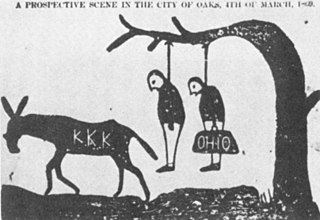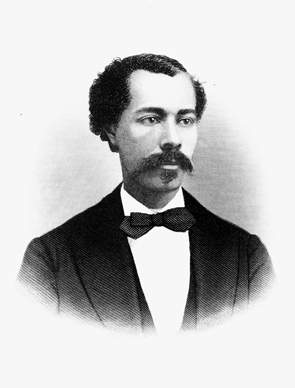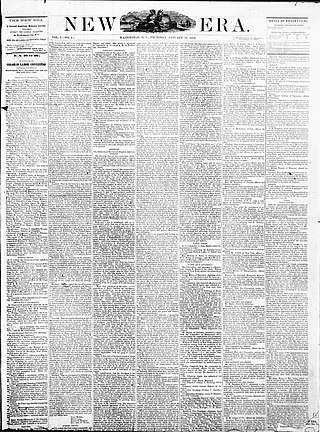Related Research Articles

The Reconstruction era was a period in American history following the American Civil War (1861–1865) and lasting until approximately the Compromise of 1877. During Reconstruction, attempts were made to rebuild the country after the bloody Civil War, bring the former Confederate states back into the United States, and to counteract the political, social, and economic legacies of slavery.
The Radical Republicans were a faction within the Republican Party originating from the party's founding in 1854—some six years before the Civil War—until the Compromise of 1877, which effectively ended Reconstruction. They called themselves "Radicals" because of their goal of immediate, complete, and permanent eradication of slavery in the United States. They were opposed during the war by the Moderate Republicans, and by the Democratic Party. Radicals led efforts after the war to establish civil rights for former slaves and fully implement emancipation. After unsuccessful measures in 1866 resulted in violence against former slaves in the rebel states, Radicals pushed the Fourteenth Amendment for statutory protections through Congress. They opposed allowing ex-Confederate officers to retake political power in the Southern U.S., and emphasized equality, civil rights and voting rights for the "freedmen", i.e., former slaves who had been freed during or after the Civil War by the Emancipation Proclamation and the Thirteenth Amendment.

In United States history, the term scalawag referred to white Southerners who supported Reconstruction policies and efforts after the conclusion of the American Civil War.
The Committee of Nine was a group of conservative political leaders in Virginia, led by Alexander H. H. Stuart, following the American Civil War, when Virginia was required to adopt a new Constitution acknowledging the abolition of slavery before its readmission into the Union. They engineered the federal and state political machinery so that separate votes would be taken on the constitution and provisions restricting voting and office-holding rights of former Confederates.

John Roy Lynch was an American writer, attorney, military officer, author, and Republican politician who served as Speaker of the Mississippi House of Representatives and represented Mississippi in the United States House of Representatives.

This is a selected bibliography of the main scholarly books and articles of Reconstruction, the period after the American Civil War, 1863–1877.
The civil rights movement (1865–1896) aimed to eliminate racial discrimination against African Americans, improve their educational and employment opportunities, and establish their electoral power, just after the abolition of slavery in the United States. The period from 1865 to 1895 saw a tremendous change in the fortunes of the black community following the elimination of slavery in the South.
The Negro Republican Party was one name used, in the period before the end of the civil rights movement, for a branch of the Republican Party in the Southern United States, particularly Kentucky, that was predominantly made up of African Americans.

New National Era(1870–1874) was an African American newspaper, published in Washington D.C. during the Reconstruction Era in the decade after the American Civil War and the Emancipation Proclamation. Originally known as the New Era, the pioneering abolitionist and writer Frederick Douglass renamed it in 1870 when he became the newspaper's publisher and editor.

Junius S. Mobley, also known as June Mobley, was a politician in South Carolina. He was considered an ultra-radical, and was one of South Carolina's 1868 Radical Republican members of the Legislature. He reportedly became a preacher after the Reconstruction era. Mobley was a political leader during the Reconstruction era in South Carolina and was involved in the distribution of ammunition to freedmen. He was part of the Union Brotherhood that replaced the Union League in 1872. Mobley was from Union County, South Carolina. John Schreiner Reynolds wrote about Mobley and other African American legislators in 1905. He was not a fan of Mobley's, and described him as "mulatto" and said he gave incendiary speeches causing bloodshed for the "men of his own race". He also referred to Mobley as a "vicious and mouthy Negro".
Robert H. Wood (1844–?) was an African American 19th-century politician, postmaster, and sheriff. He served as the first African American Mayor of Natchez, Mississippi from 1870 until 1871, and was part of the Adams County Board of Supervisors from 1871 to 1872. He was one of only five black mayors in the American South during the Reconstruction-era; and is thought to be the first black mayor in the United States.
Ovide Gregory, sometimes written as Ovid Gregory, was a politician in Alabama during the Reconstruction era. A Creole, he was multilingual and freeborn. He served in the Alabama House of Representatives.

Jesse Chisholm Duke was a religious and political leader in Alabama who established and edited the Baptist Montgomery Herald newspaper and served as a Selma University trustee. He advocated for civil rights for African Americans.
John Carraway was a tailor, seaman, civil rights activist, and politician in the United States. In Alabama during the Reconstruction era, he served as a delegate to the 1867 Alabama Constitutional Convention. He also served on Mobile, Alabama's city council, and in the Alabama House of Representatives.

The True Southerner was a weekly newspaper published during the Reconstruction era after the American Civil War in Hampton, Virginia and then Norfolk, Virginia. It advocated for the rights of African Americans and was the first African-American newspaper published in Virginia. Founded in 1865, the paper was moved to Norfolk early the next year, where Joseph T. Wilson served as its editor. The paper's offices and press were destroyed by a white mob in early 1866, and it ceased publication shortly thereafter.
The American Citizen was a newspaper published in Kansas City and Topeka, Kansas from 1888 to 1909.
The Vicksburg Times, which became the Vicksburg Daily Times, was a newspaper in Vicksburg, Mississippi in the United States. The paper was established in 1866 by Harvey Shannon and Thomas Bolling Manlove who bought out The Journal. William H. McCardle bought out Manlove’s share the following summer and served as the paper’s editor until January 1869. Giles M. Hillyer succeeded him briefly until retiring when the paper was sold. It became a Republican paper after being purchased and merged with the Vicksburg Republican and became the Daily Times and Republican.
John T. Howe was a state legislator in North Carolina. He represented New Hanover County in the North Carolina House of Representatives in 1897. Alfred Howe was his father. John worked for Alexander Manly's Daily Record newspaper as a general traveling agent. He was a Republican.
Isham Sweat was a state legislator in North Carolina. He served in the North Carolina House of Representatives representing Cumberland County.
The Facts of Reconstruction is a non-fiction book by John R. Lynch. The book, a rebuttal to critics of Reconstruction era policies in the United States, was first published in 1913.
References
- 1 2 3 Fitzgerald, Michael W. (September 1, 2002). Urban Emancipation: Popular Politics in Reconstruction Mobile, 1860–1890. LSU Press. ISBN 9780807128374 – via Google Books.
- ↑ "The Nationalist (Mobile, Ala.) 1865-1869". Library of Congress.
- ↑ Fitzgerald, Michael W. (October 1, 2000). The Union League Movement in the Deep South: Politics and Agricultural Change During Reconstruction. LSU Press. ISBN 9780807126332 – via Google Books.
- ↑ "The Nationalist. [volume]". National Endowment for the Humanities – via chroniclingamerica.loc.gov.